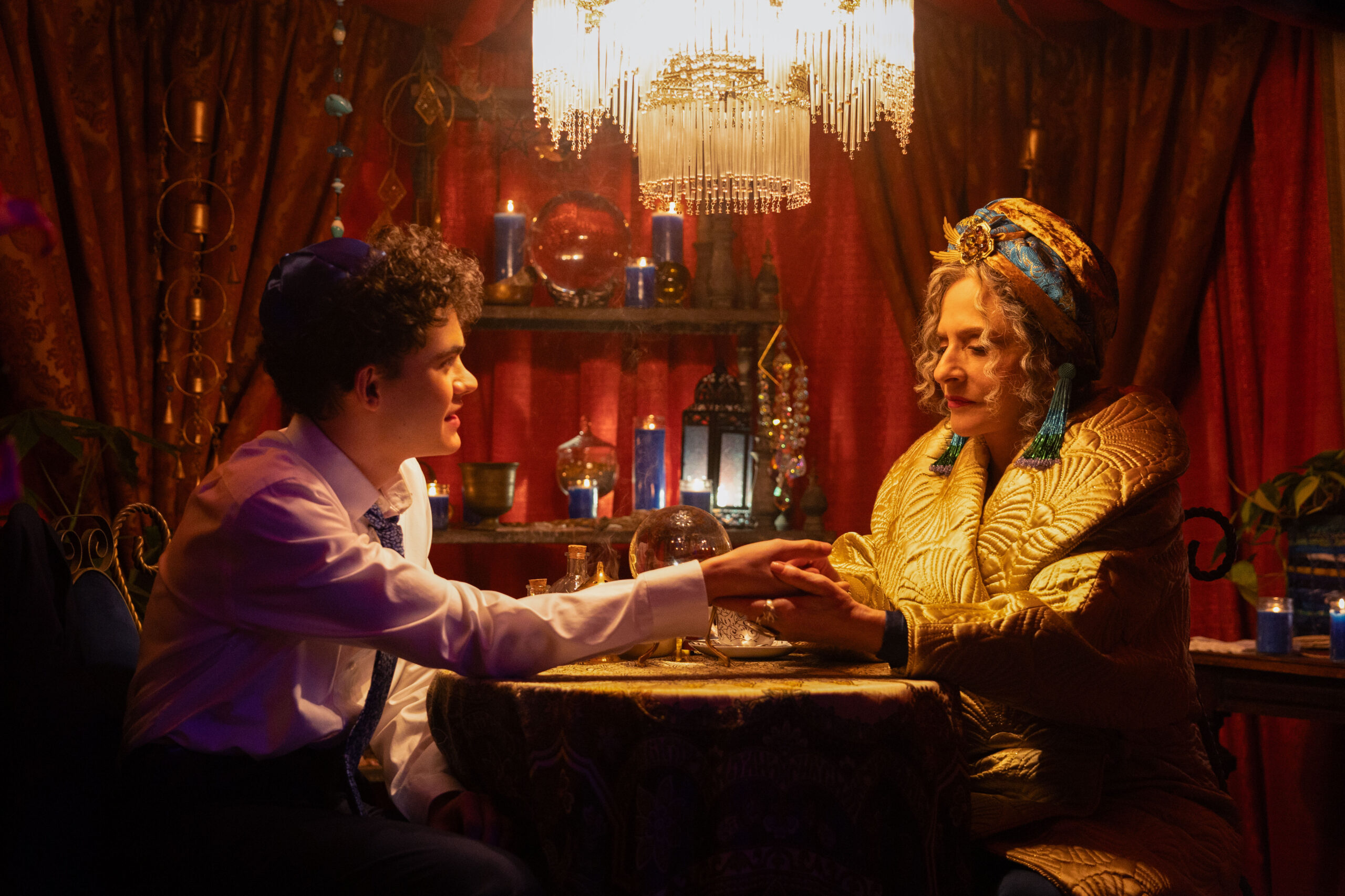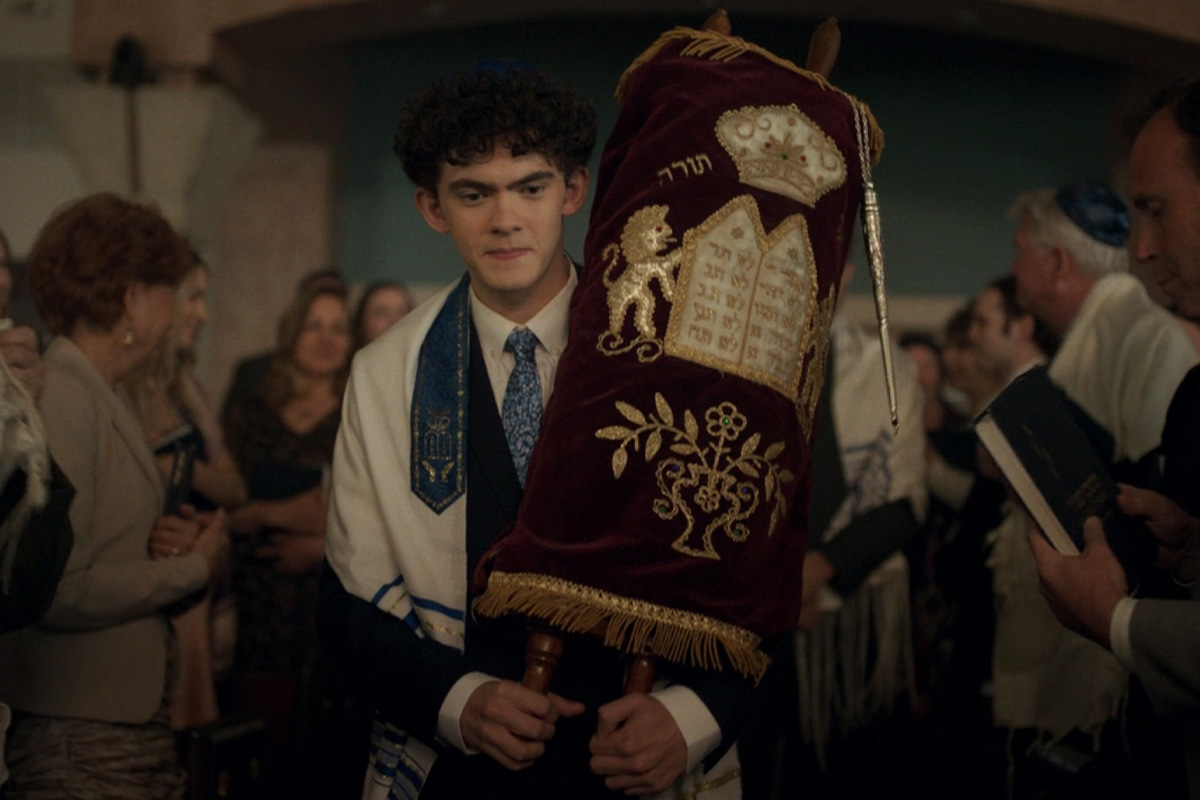Like any good witch show, Marvel’s “Agatha All Along” is a web of tightly-guarded mysteries — few greater than the enigmatic Teen (played by “Heartstopper”’s Joe Locke). With his identity hidden, viewers learn little about Teen for the first half of the show, apart from a cryptic revelation that “a lot happened to me at 13.” When episode 5, “Darkest Hour / Wake Thy Power,” confirmed the long-standing fan theory that Teen was, in fact, Billy Maximoff — or Wiccan, son of the Scarlet Witch — the reveal marked the debut not only of a long-awaited comic book character, but one of Marvel’s rare Jewish superheroes. Wiccan’s arrival raised questions not only about his character, past and motivations, but also how — or if — his Jewish identity would be represented on screen.
When the following episode opened with a flashback to his bar mitzvah, it marked not only a landmark moment for the Marvel Cinematic Universe, but a pronounced shift in its approach to Jewish characters and stories.
While Wiccan is not the first Jewish superhero to appear on screen, the MCU has a troubling history of Jewish erasure. This history is particularly notable considering how central Jewish people were to the creation of the MCU as we know it. This includes the founders of both Marvel Comics and Marvel Studios, as well as the writers and artists responsible for most of the MCU’s best known superheroes, including Scarlet Witch herself.
In her comic book appearances, Scarlet Witch, better known as Wanda Maximoff, is depicted as a Romani Jew, but both aspects of her identity are rewritten for the MCU, where she is a native of fictional Sokovia. In a franchise where religion is scarcely mentioned, it is particularly conspicuous that her bedroom wall in “Captain America: Civil War” features three crosses. “WandaVision,” a show based on her idealized view of domestic life, is meanwhile notably absent of Shabbat candles or mezuzahs, and most troubling of all, reveals that a younger Wanda voluntarily joined Hydra, the global terrorist successor to the Nazi Party, before defecting to join the Avengers.
With Wanda’s history rewritten, the only canonical Jewish superhero in the MCU is Marc Spector, or Moon Knight. While Moon Knight is unambiguously Jewish in his eponymous show — both Marc and his alter Steven Grant are shown wearing Star of David necklaces, a mezuzah is visible outside Steven’s apartment door and Marc wears a kippah at his mother’s shiva — the erasure of his Jewish identity is arguably more egregious. While Wanda’s connection to Judaism is more tangential to her story, even in the comics, it is a central part of Moon Knight’s identity and origin. The son of an Orthodox rabbi, Marc develops dissociative identity disorder and becomes Moon Knight after he discovers a trusted rabbi, who is secretly a Nazi, torturing a Jewish community member. In the show, this whole story is eliminated, with Marc developing DID in response to parental abuse in the wake of his brother’s death.
From its premiere, “Agatha All Along” showed signs of unprecedented commitment to themes Marvel has long shied away from. In much the way “Moon Knight”’s Judaism could be mistaken for an afterthought, previous MCU projects like “Loki,” “Eternals” and “Black Panther: Wakanda Forever” have acknowledged queerness only as an aside, while “Agatha All Along,” for the first time in the Universe, features multiple queer characters (including Wiccan) in central, plot-significant queer relationships.
In similar contrast to previous projects, it does not hold back on its commitment to Judaism. If the previous episode leaves a giant question mark over Wiccan’s origins and identity, episode 6, “Familiar By Thy Side,” provides an immediate and resounding answer in the form of a blue and white floral tie and satin kippah that can only be described as “tri-state bar mitzvah chic.” We learn that before becoming Billy Maximoff, Teen was William Kaplan, a Jewish 13-year-old from Eastview, NJ, and we are all invited to his “Magick Mitzvah.” Marked by flashing blue lights, a committed theme and crowds of self-conscious seventh graders, this episode leans fabulously into the vibes of an archetypical New Jersey Reform bar mitzvah.
But the show is at its most thoughtful when engaging with the ceremony itself, easing through slow-motion footage of William walking to the bimah, layered with Locke’s beautifully-sung Torah blessings. William’s Torah portion is Leviticus 10:1-2, chosen by Rabbi Alexandria Shuval-Weinder, who also played his rabbi onscreen, and helped Locke (who is not Jewish) prepare for the scene. This passage, which describes two brothers meddling in supernatural forces they don’t understand, reflects the themes of the show itself and, moreover, foreshadows the apparent death later that day of Wanda’s sons, the original Billy Maximoff and his twin brother Tommy, as depicted in “WandaVision.”
Like Moon Knight, Judaism is central to Wiccan’s depiction in Marvel Comics. But unlike previous MCU projects, the commitment to Judaism in “Agatha All Along” goes well beyond mere representation. While Judaism does not specifically motivate or transform Wiccan, it intersects significantly with his story in ways the show does not overlook.

At his bar mitzvah, William meets divination witch Lilia Calderu (Patti LuPone), who notes that his lifeline is broken in two. When William is alarmed, Lilia notes that this may simply signify a major transformation — like him becoming a man. When later that day, William dies in a car crash, Billy’s soul transfers into his body. He is immediately brought back to life with little sense of who or where he is, and with mysterious powers he can neither understand nor control. It is impossible to ignore the significance of this transformation happening on the day of his bar mitzvah. Whereas comic William is simply born as an incarnation of Billy, the show’s rewrite makes his story more Jewish than it was before.
Wiccan’s story in the show also serves as something of a redemption for Wanda’s, reintroducing Judaism through her son, who is somehow both William and Billy. “You are so much like your mother,” Agatha (Kathryn Hahn) tells him, by way of revealing his identity to the viewer. Wiccan spends the following episodes reckoning not only with his own identity, but also his mother’s. He affirms that he sees Rebecca Kaplan as his mom, yet he has inherited Wanda’s power and her crown — and knows that Tommy is his brother. If his specific struggle is unique, it evokes questions of identity so many Jews can identify with, particularly those with non-traditional backgrounds. Judaism is not just window dressing on Wiccan’s journey, but inseparable from it.
In an interview with Variety, showrunner Jac Schaeffer said honoring Judaism in Wiccan’s story was “imperative,” but that she was also conscious of not “shoehorning” the bar mitzvah scene into the show. Schaeffer, whose father’s family is Jewish, but is not herself religious, says that she was inspired by the connections Jewish writers on the show drew between the bar mitzvah ceremony and the witches’ similar commitment to sacred ritual. Locke, too, says he was conscious of his responsibility to depict Wiccan’s story correctly. “This is something I’ve grappled with over the last few years,” he told Variety. “I wanted to make sure that those scenes were tackled with the highest respect. I stressed a lot over making sure that we did that right.”
As Marvel has moved towards more visible efforts to create diverse content, it’s often found itself in a crossfire between accusations of “going woke” and accusations of tokenism. While the former assumes that any inclusion of diversity — including race, religion, sexuality, gender or disability — needs to justify its presence, the latter refutes that claim, while simultaneously reminding that it is a disservice to these characters and the communities they represent to divorce those identities from their stories. This widespread pushback shows the perils of committing to only the letter of diversity. It’s a problem that extends well beyond the MCU, and one that manages to alienate all viewers as it rejects an opportunity to enrich its storytelling universe.
While the MCU has work yet to do in building and enriching its canon of feminist, queer and Jewish stories, “Agatha All Along” marks a noted departure from this trend. Characters are depicted as well-rounded and multifaceted, yet realistically informed by who they are. Identity is not an aside, it’s an integral part of each character’s story. Judaism is just one piece of what makes Wiccan who he is, but by centering his bar mitzvah in his origin story, “Agatha All Along” makes a definitive statement that it is an important piece nonetheless. In contrast to the MCU’s history of erasure, it’s a promising first step down the road.



